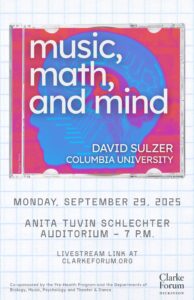 Anita Tuvin Schlechter Auditorium, 7 p.m.
Anita Tuvin Schlechter Auditorium, 7 p.m.
Music, Math, and Mind
David Sulzer, Columbia University
Dr. Sulzer will discuss how music is heard and understood in the nervous system by humans and other animals with a cortex. In this lecture, we’ll also explore other animals who can play music, especially the Thai Elephant Orchestra.
This program is presented by the Clarke Forum for Contemporary Issues and co-sponsored by the Pre-Health Program and the departments of biology, music, psychology and theater & dance. The Clarke Forum’s student project managers initiated this program. The program is also part of the Clarke Forum annual theme, Thought Experiments.
Topic overview written by Supasinee Siripun ’27
Biography (provided by the speaker)
 Dave Soldier leads a double life as a musician and a neuroscientist. As composer, he cofounded (with conservationist Richard Lair) the Thai Elephant Orchestra, 14 elephants for whom he built giant instruments and who released 3 CDs, and projects with children, including rural Guatemala (Yol Ku: Mayan Mountain Music) and New York’s East Harlem (Da HipHop Raskalz). His Soldier String Quartet helped usher the use of hip-hop, R&B, and punk rock into classical music in the 1980s, and his long-running Memphis/New York Delta punk band, the Kropotkins, is a cult favorite. His composed The People’s Choice Music: the most wanted and unwanted songs, following poll results of likes and dislikes of the American population, with artists Komar & Melamid; song cycle/oratorios in collaborations with Kurt Vonnegut, and many chamber and classical works. As a performer and arranger, he worked with John Cale, Bo Diddley, Van Dyke Parks, David Byrne, and many jazz and avant garde acts, appearing on over 100 albums and films on violin, guitar, or arranger. The Violinist, is a film/theater work of his pieces for violin and piano (starring Rebecca Cherry, produced by Winsome Brown).
Dave Soldier leads a double life as a musician and a neuroscientist. As composer, he cofounded (with conservationist Richard Lair) the Thai Elephant Orchestra, 14 elephants for whom he built giant instruments and who released 3 CDs, and projects with children, including rural Guatemala (Yol Ku: Mayan Mountain Music) and New York’s East Harlem (Da HipHop Raskalz). His Soldier String Quartet helped usher the use of hip-hop, R&B, and punk rock into classical music in the 1980s, and his long-running Memphis/New York Delta punk band, the Kropotkins, is a cult favorite. His composed The People’s Choice Music: the most wanted and unwanted songs, following poll results of likes and dislikes of the American population, with artists Komar & Melamid; song cycle/oratorios in collaborations with Kurt Vonnegut, and many chamber and classical works. As a performer and arranger, he worked with John Cale, Bo Diddley, Van Dyke Parks, David Byrne, and many jazz and avant garde acts, appearing on over 100 albums and films on violin, guitar, or arranger. The Violinist, is a film/theater work of his pieces for violin and piano (starring Rebecca Cherry, produced by Winsome Brown).
As David Sulzer, he is a neuroscientist and Professor at Columbia University in the Departments of Psychiatry and Neurology. Sulzer‘s lab investigates the synapses of the cortex and basal ganglia including the dopamine system, in habit formation, planning, and decision making. His lab and collaborators have made major contributions to understanding the action of addictive drugs and causes of diseases including Parkinson’s, Huntington’s and autism. They developed the first methods to directly measure the fundamental unit of neurotransmission (quantal neurotransmitter release) and the first optical method to visualize neurotransmission at the synaptic level in the brain (by developing fluorescent false neurotransmitters).
A few projects unite these personalities. With computer musician Brad Garton, he initiated the Brainwave Music Project, which allows musicians to perform using their brain’s electrical activity and teaches audiences about the nervous system. With chemist Roald Hoffmann, he ran the monthly science meets art series, Entertaining Science, at the Cornelia Street Cafe. And he has a series of new pieces that use mathematic transformations including fractals and calculus to create new repertoire, such as a 20 minute version of Chopin’s Minute Waltz.
Related Links
Music, Math, and Mind: The Physics and Neuroscience of Music (Columbia University Press)
Listen to Dave Soldier on Spotify
Video of the Presentation
